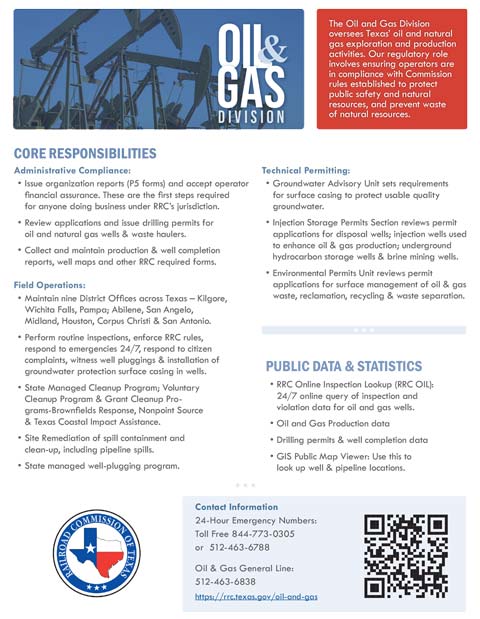
Proration Schedules
Oil & Gas ANNOUNCEMENTS
Railroad Commission Updates Implementation Information for New Chapter 4 Rules
June 30, 2025
With the implementation of the new Chapter 4, Subchapter A waste management rules on July 1, 2025, the Railroad Commission has updated the Environmental Permits and Support Unit page on the RRC website to include current information to help stakeholders with the implementation. The website includes guidance focused on the changes relevant to the new rules, including Authorized Pits, Waste Profiles and Waste Manifests.
The website includes draft versions of several forms which may be used even though they are still being proposed and have not been formally adopted by the Commission. Recorded webinars from earlier this spring and other materials are also available for download on the website.
Any information regarding implementation of the new Chapter 4 rules can be directed to the Environmental Permits and Support Unit at (512) 463-3840 or by sending an email to EPSch4@rrc.texas.gov. The webpage contains other contacts for specific programs, such as Authorized Pits, Waste Haulers and Waste Management Permits.
What we do
The Railroad Commission, through its Oil and Gas Division, regulates the exploration, production, and transportation of oil and natural gas in Texas. Its statutory role is to:
- prevent waste of the state's natural resources,
- protect the correlative rights of different interest owners,
- prevent pollution, and
- provide safety in matters such as hydrogen sulfide.
The division accomplishes these goals by permitting and reporting requirements; by field inspections, testing programs and monitoring industry activities in the field; and through programs to remediate abandoned wells and sites through the use of fees and taxes paid by industry.
The Oil and Gas Division is headquartered in Austin, Texas with nine district offices spread over the state.
Drilling Permit Processing Time
as of March 7th, 2025
Business days
Standard Permits: approximately 4
Business days








